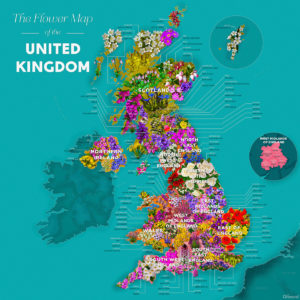Supporting Wildlife At Home
National biodiversity is rapidly in decline and we need your support to help reverse this trend. People’s gardens have been manicured and cultivated for our own pleasure for far too long. This is in turn having a dramatic effect on urban wildlife and the green corridors our gardens provide, for their movement from one habitat to another.
The biggest move we can all make to help support wildlife in our gardens, is to take less consideration of what we think looks pretty. This being said, your garden doesn’t have to look like a bomb-sight; but we do need to start using less exotic species that we like the look of and think more about what our local wildlife likes and needs. Planting wild flowers that grow naturally in your county is a great way to help wildlife in your area.
Take a look at this Flower Map published by On Stride Financial which exhibits a graphical representation of the flowers chosen by each UK county. This data is based on the Plantlife International UK Vote in 2002. The resulting map is an mix between indigenous plants and those introduced by human culture. We really should be focusing more on the indigenous plant species if we want to support our native wildlife.
Why not consider planting some of the most endangered species of Wildflower in the UK and take a look at the Wildflower Garden website for more tips on starting and maintaining your own wildflower garden.
Support Wildlife In The Community
Just like the Bioblitzr team and our Glow Not Mow campaign; there are many ways that you can help to support wildlife in your local community. Below are listed just a few ideas that you can take on board.
- Join your local Wildlife Trust
- Join a local “Friends of…” group
- Find local wildlife volunteering opportunities
- Hold a Bioblitz in your area
Another big thing we can all do to help wildlife locally, is to keep an eye on your local council. Now what we don’t mean here is go hunting for any staff wearing local council uniform; while they are on duty carrying out their work, they are busy and have plenty to do. What we do mean is to watch for activity that your local council may not know is damaging the local wildlife habitat; and then let them know through the proper channels. We can’t expect them to know about all wildlife in all areas. So let’s show our support by being extras pairs of eyes for them.
If you can think of any other ways to help wildlife in your garden and in your local community, why not share it on our facebook page and it might get featured here, don’t forget to tell all your friends and family too!
